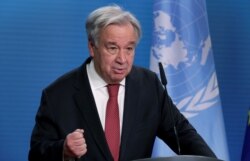For a moment, the world forgot the coronavirus pandemic.
News channels worldwide switched from reporting on overwhelmed hospitals or the rollout of vaccines and the imposition of lockdowns to focus on the United States and the storming of Congress by hundreds of protesters.
America’s foes and allies alike drew different lessons from the mayhem, which took place shortly after President Donald Trump urged his supporters at a nearby rally to “take back our country.” The bid failed, and Joe Biden was confirmed as the president-elect by Congress early Thursday morning.
Allies were aghast at the images being broadcast from Washington. Enemies reacted with amusement.
Some governments saw the chaos as a serious last-minute bid by Trump supporters to overturn the election. Others, while viewing the mayhem as grave and dismaying, expressed continued faith in the resilience of U.S. democracy.
Australian Prime Minister Scott Morrison condemned what he described as “very distressing scenes” but said he looked forward to the peaceful transfer of power to the newly elected U.S. president, calling it on Twitter a “great American democratic tradition.”
In a video posted on Twitter, French President Emmanuel Macron, who has endured his share of street protests in the past year, described the attack on Congress as “not America,” adding he had “confidence in the strength of democracy in the United States.”
That view was shared by New Zealand Foreign Minister Nanaia Mahuta, who said the events in Washington were a source of regret but that New Zealand looked forward to the peaceful transition of power.
“Violence has no place in thwarting democracy,” she wrote on Twitter. “We look forward to the peaceful transition of the political administration, which is the hallmark of democracy.”
European Union leaders also emphasized they harbor no doubts about the onward advance of U.S. democracy.
Charles Michel, president of the European Council, said while he was shocked at the events in Washington, he described the U.S. Congress as a “temple of democracy.”
European Commission President Ursula von der Leyen stressed the “strength of U.S. institutions and democracy,” saying she was looking forward to working with Joe Biden as the next president.
Canadian Prime Minister Justin Trudeau said he was “deeply disturbed and saddened" by what had unfolded in Washington but said “democracy in the U.S. must be upheld — and it will be.”
Foes exploited the mayhem to try to score geopolitical points. Venezuela, which has been sanctioned by the U.S. and European nations for human rights abuses, said the U.S. “is suffering what it has generated in other countries with its politics of aggression.”
China’s Foreign Ministry was quick to brand the pro-Trump agitators as “thugs, extremists and villains,” but likened them to pro-democracy activists in Hong Kong, who have been protesting the crackdown on free speech and dissent and the undermining of democracy.
“Some people in the U.S. reacted and used very different words to what happened in Hong Kong in 2019 and what is happening in the U.S. today. This sharp contrast and the reasons behind it are thought-provoking,” Foreign Ministry spokeswoman Hua Chunying said Thursday.
Iran’s president cited the storming of the U.S. Capitol as an example of the weakness of Western democracy. Speaking Thursday, President Hassan Rouhani said, “What we saw in the United States shows above all how fragile and vulnerable Western democracy is.”
U.N. Secretary General Antonio Guterres said he was “saddened” by the breach of the Capitol, according to spokesman Stephane Dujarric.
“In such circumstances, it is important that political leaders impress on their followers the need to refrain from violence, as well as to respect democratic processes and the rule of law,” Dujarric said in a statement.
British Interior Minister Priti Patel said Trump’s comments directly led to the violence that took place in Washington, adding that he “did very little to de-escalate” the situation.
Speaking on Sky News, Patel described the U.S. as a beacon of democracy but condemned Wednesday’s riot.
“Someone was shot. People have died. This is terrible — terrible beyond words, quite frankly, and there is no justification for it.”
British Prime Minister Boris Johnson has said it was "completely wrong" for doubt to be cast on the result of last year's presidential election. He said Thursday: "All my life America has stood for some very important things — an idea of freedom and an idea of democracy. In so far as he [Trump] encouraged people to storm the Capitol and in so far as the president has consistently cast doubt on the outcome of a free and fair election, I believe that that was completely wrong."
German Chancellor Angela Merkel said she felt “angry and also sad” about the events. She told a meeting of German conservatives, “I regret very much that President Trump has still not admitted defeat, but has kept raising doubts about the elections.”
Other politicians and analysts discussed the longer-term impact of the riot. Several suggested that Wednesday’s events, and those leading up to it, showed the deep- rootedness of U.S. democracy.
“The Founding Fathers dug deep foundations,” argued Tom Tugendhat, a senior British Conservative lawmaker and chairman of Parliament’s foreign affairs select committee. “That’s clear from the judges’ resistance to political pressure in more than 60 court cases which President Trump has lost trying to overturn the presidential election result. Even those judges appointed by Republicans, some by Trump himself, have made clear his failure to produce any evidence of electoral fraud makes his claims groundless, and rejected them.”
Tugendhat also noted how state officials from Trump’s Republican Party similarly refused to bow to pressure to overturn the results.
“This is not a democracy about to fall,” he said.
Speaking to VOA, British lawmaker Lisa Nandy, the international spokesman of the main opposition Labour Party, said: “Across Britain most people were just watching with a real sense of shock and horror. America is seen in Britain as one of the world's great democracies. I think the overwhelming emotion that most British people were feeling was one of solidarity.”
She said there would be inevitable damage to America’s reputation from a mob storming Congress and it might “embolden some of those leaders around the world who are currently trying to attack a democracy in their own country.” But she added: “Having said that, I think there was optimism about yesterday as well. That sounds like a strange thing to say, but the way in which Joe Biden came out and appealed for calm and talked about the assault on democracy, that was the sort of leadership that we haven't heard from the United States for years.”










